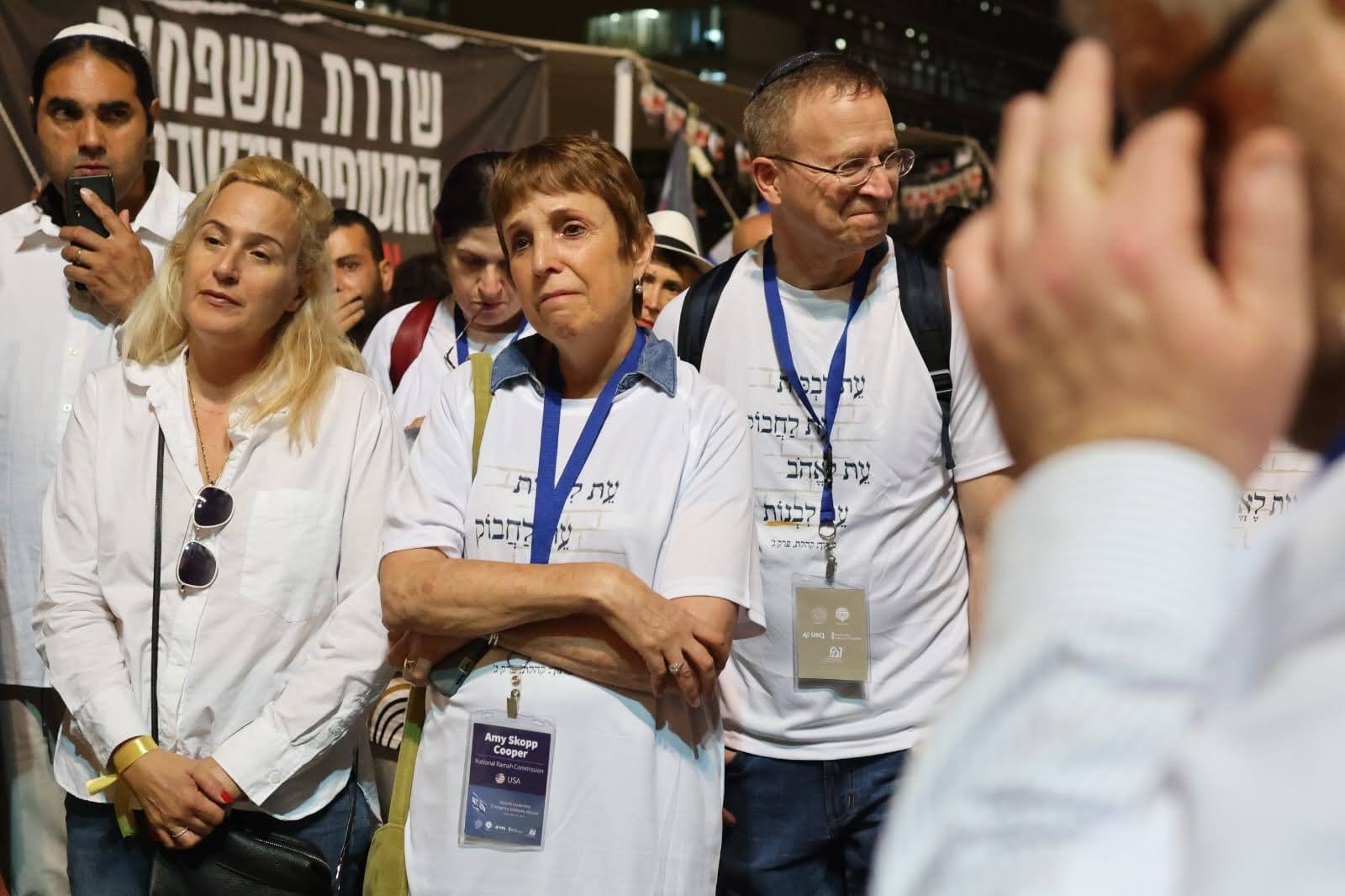A Month in Israel
Amy Skopp Cooper, National Ramah Director
I departed for Israel on October 8 and entered a stunned country. A month later, we are starting to talk about the trauma we are experiencing. We talk in present tense; there is no post-traumatic stress—not yet.
I am a child of the Yom Kippur War. My family was living in Jerusalem and the sirens from that Yom Kippur afternoon have always reverberated in my soul, fueling my passion for Israel and my early aspirations to be a Jewish educator. I am a parent of this war, deeply worried about my youngest son, who is a combat soldier. I can’t give you an update as to how our soldiers—our heroes—are doing; none of us have heard from our children. How do I feel? Sad, terrified, anxious, exhausted, sometimes numb. It is a vicious cycle with no end in sight.
What stories can I share?
I’ve been going to Tel Aviv on a regular basis. Families of the chatufim (I don’t know how to translate chatufim—hostages, kidnapped, missing, babies, Shoah survivors; there just doesn’t seem to be a good translation.) and thousands of others gather at the plaza outside of the Tel Aviv Museum of Art. I posted a Facebook live video on the first day of the Shabbat Table installation. Since then, this square has drawn thousands of people daily. On my recent visit this week, together with Masorti leaders from around the world (more below), I saw Ramah shlichim, sang with teens from youth movements, prayed with my Masorti colleagues, spoke to families of the missing, and visited countless new art installations. In some ways it reminds me of Kikar Rabin in November 1995—a grieving nation holding on to each other, supporting families and praying for strength and resilience.
Our Masorti Solidarity Mission, representing movement leaders from North and South America, Israel, and Europe, brought us to remarkable places. On the first day, we met with grassroots volunteer leaders who have transformed the underground parking lot of the Tel Aviv Convention Center into a huge distribution center, ensuring that both civilian and military needs are being met. Software engineers have volunteered to build the platforms needed to manage the site, and countless volunteers are processing clothing, toys, furniture, army equipment, and baby supplies. Later we visited the new Hostage and Missing Families Forum office complex, which includes a legal department, social service agencies, medical teams, and various support services, many staffed by volunteers.
Our Ramah Israel staff has also been actively engaged in volunteer efforts. To date, they have raised over $50,000 and have purchased and distributed huge volumes of army supplies. I am proud to be their colleague. Grassroots volunteer leadership is a remarkable chapter of this unfolding story, one that must be sustained for decades to come.
Our mission met with Dr. Ayelet Levy Shachar, mother of Naama Levy. Naama was kidnapped on October 7 and the video of her abduction was shared by Hamas. Ayelet, a sports physician, spoke of the intense and life-altering pain her family is enduring. There was not a dry eye in the room.
On our second day, we spent the day in southern Israel first visiting Kibbutz Kfar Aza and witnessing firsthand the utter destruction of a once vibrant community. I’m including a video here.
Later that day, we visited the parking lot where all of the cars from the Nova Music Festival have been brought. There are hundreds of burnt-out cars, most with shattered windows and bullet holes. Inside the cars are phone chargers, keys, cookie crumbs, wallets and bags—signs of what was once normal life.
Most of us found it hard to speak as we left the South.
On the final day of our mission, we had the honor of meeting with President Isaac and Michal Herzog. We shared stories from our communities: dangerous antisemitism, fears for our college students, and a myriad of security concerns. President Herzog responded and shared what Israel was doing to combat these issues, even during its darkest hour. I introduced myself as the director of National Ramah (President Herzog worked at Ramah New England as a teen) and the mother of a lone soldier. At the conclusion of our meeting, the president and Michal came over to me and asked for my son’s Hebrew name so that they could make a misheberach. A staff member took down the information.
Masorti Solidarity Mission with President Isaac and Michal Herzog
There are some beautiful photos from our conversation but I am not permitted to post them. In a country filled with thousands of grieving families and tens of thousands of parents worried about their children at war, Herzog reached out to me with caring and compassion. I will never forget it.
There’s no conclusion to this post. I have no idea what the next hour, the next day, or the next month will bring. This I know: we must be strong, hopeful and proud. We must march in Washington; we must speak out against hatred and bigotry; we must reach out to every Israeli citizen we know to show them how much we care. And when possible, we must visit Israel. We have no choice right now. There is urgency. We MUST.
Tremendous gratitude to Dr. Yizhar Hess, Vice Chairman of the World Zionist Organization and the entire Masorti team that put together our remarkable three-day program.




